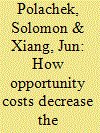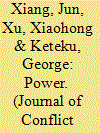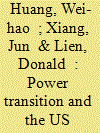|
|
|
Sort Order |
|
|
|
Items / Page
|
|
|
|
|
|
|
| Srl | Item |
| 1 |
ID:
174822


|
|
|
|
|
| Summary/Abstract |
Existing studies of the impact of economic development on political trust in China have two major gaps: they fail to explain how economic development contributes to the hierarchical trust pattern, and they do not pay enough attention to the underlying mechanisms. In light of cultural theory and political control theory, we propose adapting performance theory into a theory of “asymmetrical attribution of performance” to better illuminate the case of China. This adapted theory leads to dual pathway theses: expectation fulfillment and local blaming. Using a multilevel mediation model, we show that expectation fulfillment mainly upholds trust in the central government, whereas local blaming undermines trust in local governments. We also uncover a rural–urban distinction in the dual pathway, revealing that both theses are more salient among rural Chinese.
|
|
|
|
|
|
|
|
|
|
|
|
|
|
|
|
| 2 |
ID:
149128


|
|
|
|
|
| Summary/Abstract |
Scholars, observing clustering in transitions to democracy, argue that democratization diffuses across borders as citizens in autocracies demand the same reforms they witness in neighboring states. We disagree. This article demonstrates that diffusion plays only a highly conditional role in democratization. We advance and test an alternative two-step theory of clustered democratization: (1) economic and international political shocks, which are clustered spatially and temporally, induce the breakdown of authoritarian regimes; then (2) democratic diffusion, in turn, influences whether a fallen dictatorship will be replaced by a democracy or a new autocracy. Diffusion, despite playing an important role, is insufficient to explain the clustering of transitions. Using data on 125 autocracies from 1875 to 2004, we show that economic crises trigger authoritarian breakdowns, while diffusion influences whether the new regime is democratic or authoritarian.
|
|
|
|
|
|
|
|
|
|
|
|
|
|
|
|
| 3 |
ID:
185486


|
|
|
|
|
| Summary/Abstract |
While a great deal of research has examined determinants of military spending, few studies have systematically investigated how legislators vote on defense expenditures. This study fills this important gap. Based on a sample of roll-call data on defense spending from the 112th U.S. House, we estimate legislators’ ideal points through an item response model. Several interesting findings emerge. First, Republicans are more likely to favor military spending, a finding that is both statistically and substantively significant throughout our analysis. In addition, interest group campaign contributions play an important role by increasing the probability a legislator supports defense spending. Third, when a congressional district has a larger number of veterans or a lower rate of unemployment, its elected legislator is likely to favor military spending. Finally, the effect of public opinion disappears after the district demographics are controlled for.
|
|
|
|
|
|
|
|
|
|
|
|
|
|
|
|
| 4 |
ID:
093822


|
|
|
|
|
| Publication |
2010.
|
| Summary/Abstract |
This article shows that the opportunity costs resulting from economic interdependence decrease the probability of war in an incomplete information game. This result is strongly consistent with existing empirical analyses of the inverse trade-conflict relationship but is the opposite of the conclusion reached by Gartzke, Li, and Boehmer, who reject the opportunity cost argument in a game-theoretic framework. As a result of our findings, one cannot dismiss the opportunity cost argument as the explanation why trading nations fight less. Instead our study reaffirms the central position of opportunity costs as the basis for the inverse trade-conflict relationship, thus implying that one need not rely on signaling.
|
|
|
|
|
|
|
|
|
|
|
|
|
|
|
|
| 5 |
ID:
078689


|
|
|
|
|
| Publication |
2007.
|
| Summary/Abstract |
We join the debate on trade interdependence and conflict with a reexamination of Barbieri's (1996) intriguing empirical results showing that under certain circumstances, trade interdependence causes conflict. We argue that these findings resulted from a specification that was missing a variable. We return to Barbieri's models and introduce two independent power measures for countries within each dyad. When a correctly specified trade-conflict regression model incorporating the new power variables is performed, the constraining effect of interdependence becomes evident, and the results obtained are the reverse of Barbieri's.
|
|
|
|
|
|
|
|
|
|
|
|
|
|
|
|
| 6 |
ID:
174854


|
|
|
|
|
| Summary/Abstract |
Many scholars have examined how the United States should respond to a rising non-democratic China. Contrary to the well-debated hard power domain, little attention has been devoted to China’s soft power. This study is arguably the first to systematically investigate the US response to the establishment of Confucius Institutes—China’s global initiative to expand soft power. We argue that the US decision to establish Confucius Institutes is influenced by both macro- and micro-level variables. At the macro-level, as suggested by the power transition theory, the United States is more likely to accommodate Confucius Institutes when China shows a higher level of satisfaction with the United States. At the micro-level, US universities and state governments host Confucius Institutes due to budget saving and community engaging. Our analysis sheds light on how the United States makes trade-offs when confronting China’s expanded soft power, and it provides yet another prominent example of money buying influence in international relations.
|
|
|
|
|
|
|
|
|
|
|
|
|
|
|
|
|
|
|
|
|